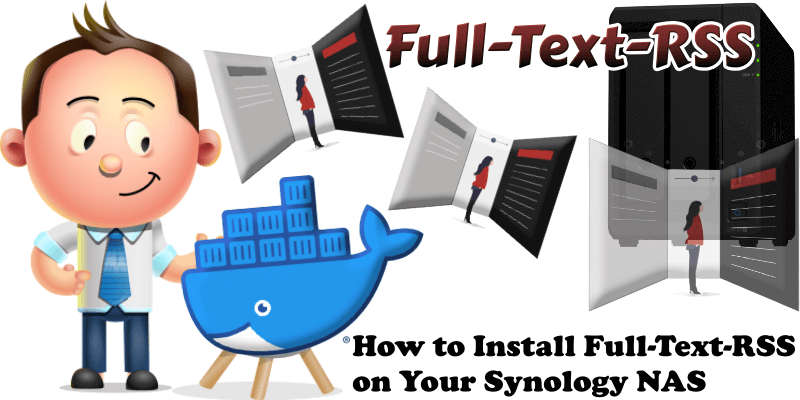
Full-Text-RSS retrieves the full-text of individual articles or complete full-text RSS feeds. In this step by step guide I will show you how to install Full-Text-RSS on your Synology NAS using Docker & Portainer.
STEP 1
Please Support My work by Making a Donation.
STEP 2
Install Portainer using my step by step guide. If you already have Portainer installed on your Synology NAS, skip this STEP. Attention: Make sure you have installed the latest Portainer version.
STEP 3
Go to File Station and open the docker folder. Inside the docker folder, create one new folder and name it fulltextrss. Follow the instructions in the image below.
Note: Be careful to enter only lowercase, not uppercase letters.
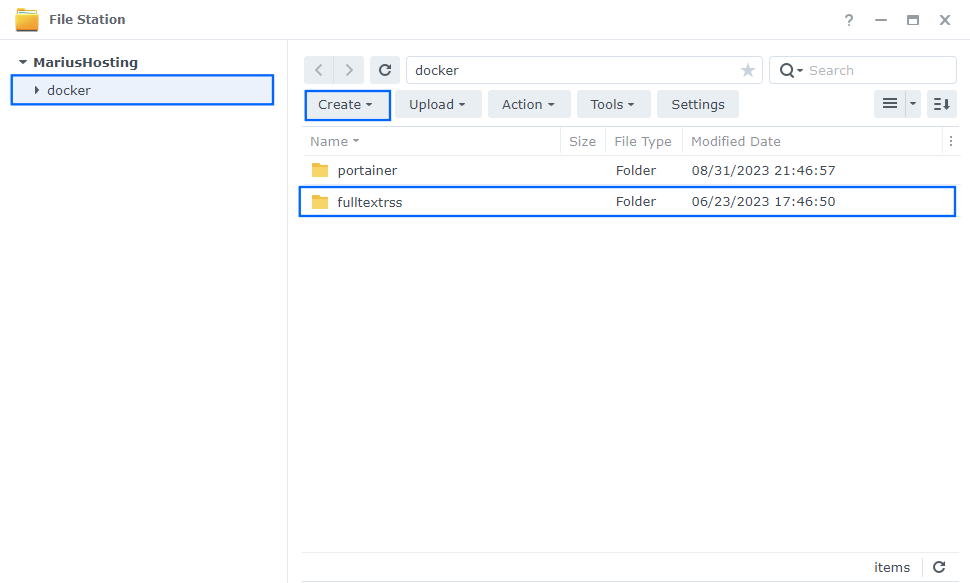
STEP 4
Right click on the fulltextrss folder that you have previously created at STEP 3 then click Properties. Follow the instructions in the image below.
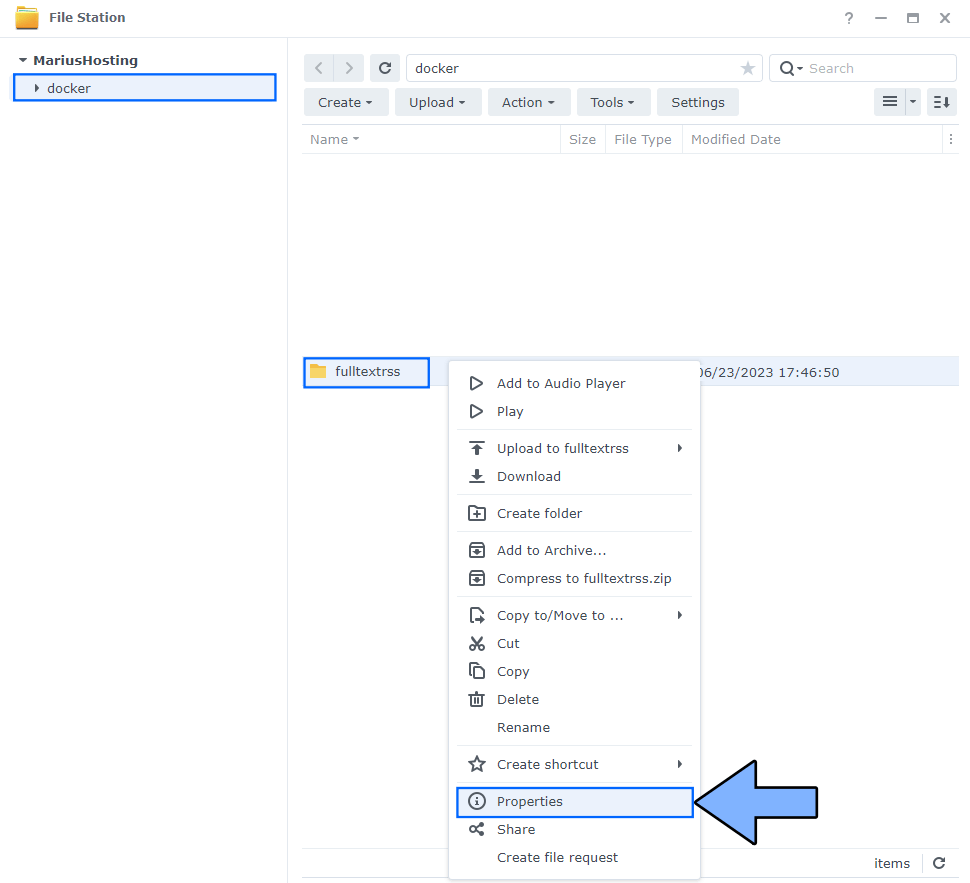
STEP 5
Go to the Permission tab, then click Advanced options. From the drop-down menu, choose “Make inherited permissions explicit“. Follow the instructions in the image below.
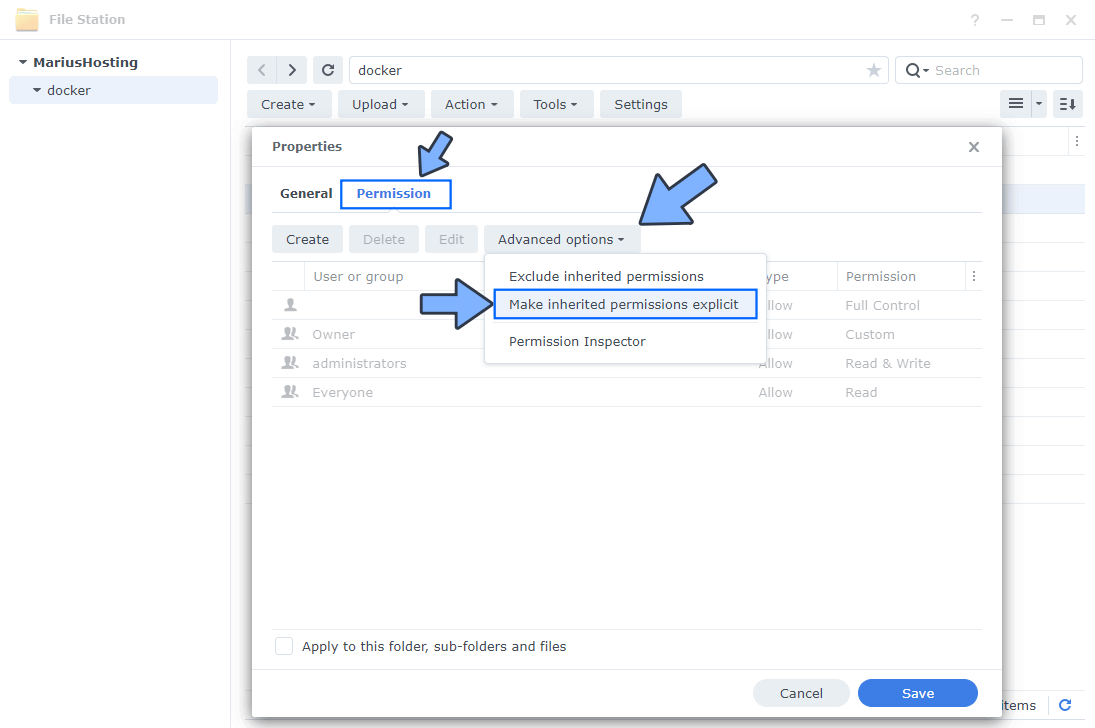
STEP 6
Select Everyone then click the Edit tab. Follow the instructions in the image below.
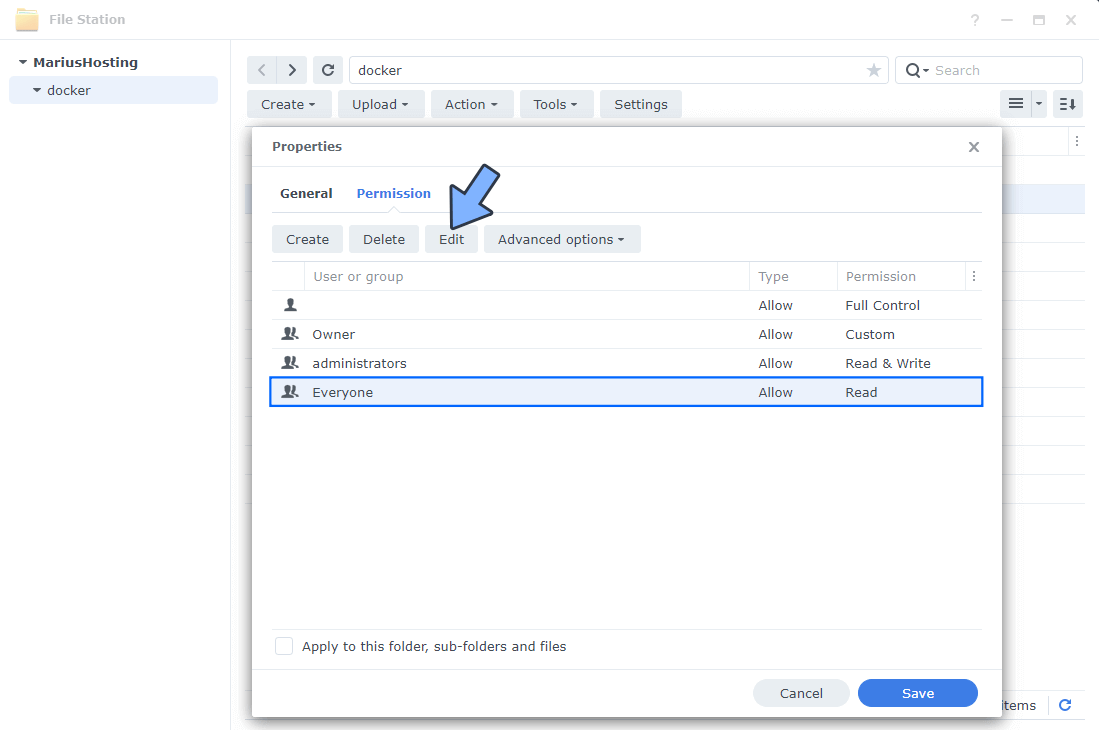
STEP 7
Check all Read and Write Permissions. Click Done. Follow the instructions in the image below.
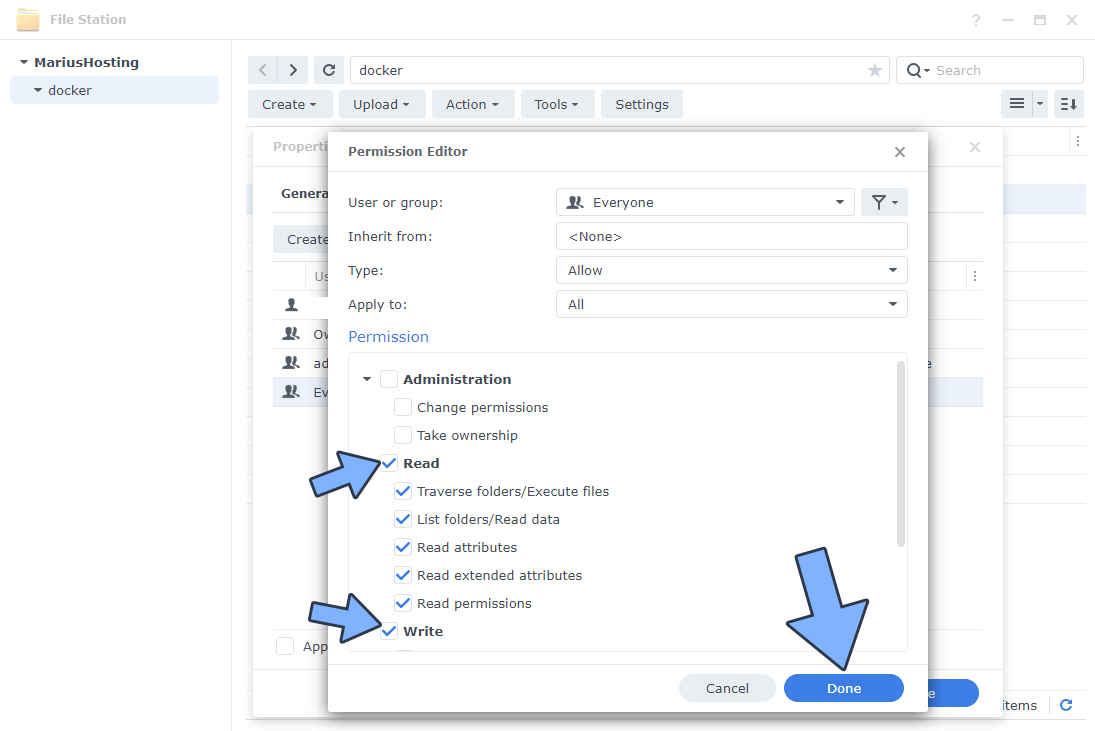
STEP 8
After you click Done on STEP 7, check “Apply to this folder, sub-folders and files“. Click Save. Follow the instructions in the image below.
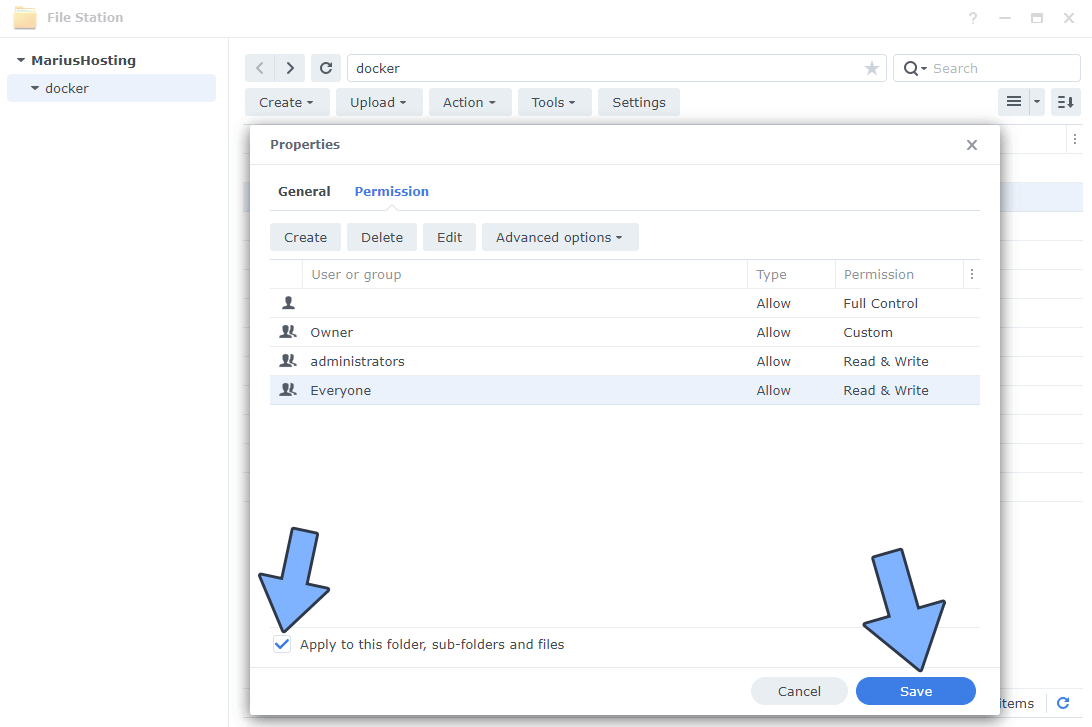
STEP 9
Log into Portainer using your username and password. On the left sidebar in Portainer, click on Home then Live connect. Follow the instructions in the image below.

On the left sidebar in Portainer, click on Stacks then + Add stack. Follow the instructions in the image below.

STEP 10
In the Name field type in fulltextrss. Follow the instructions in the image below.
version: "3.9"
services:
full-text-rss:
image: heussd/fivefilters-full-text-rss:latest
container_name: Full-Text-RSS
hostname: full-text-rss
mem_limit: 1g
cpu_shares: 1024
security_opt:
- no-new-privileges:true
healthcheck:
test: curl -f http://localhost:80/ || exit 1
ports:
- 9571:80
volumes:
- /volume1/docker/fulltextrss:/var/www/html/cache/rss:rw
environment:
FTR_ADMIN_PASSWORD: mariushosting
restart: on-failure:5
Note: Before you paste the code above in the Web editor area below, change the value for FTR_ADMIN_PASSWORD with your own password. mariushosting is an example for a password.
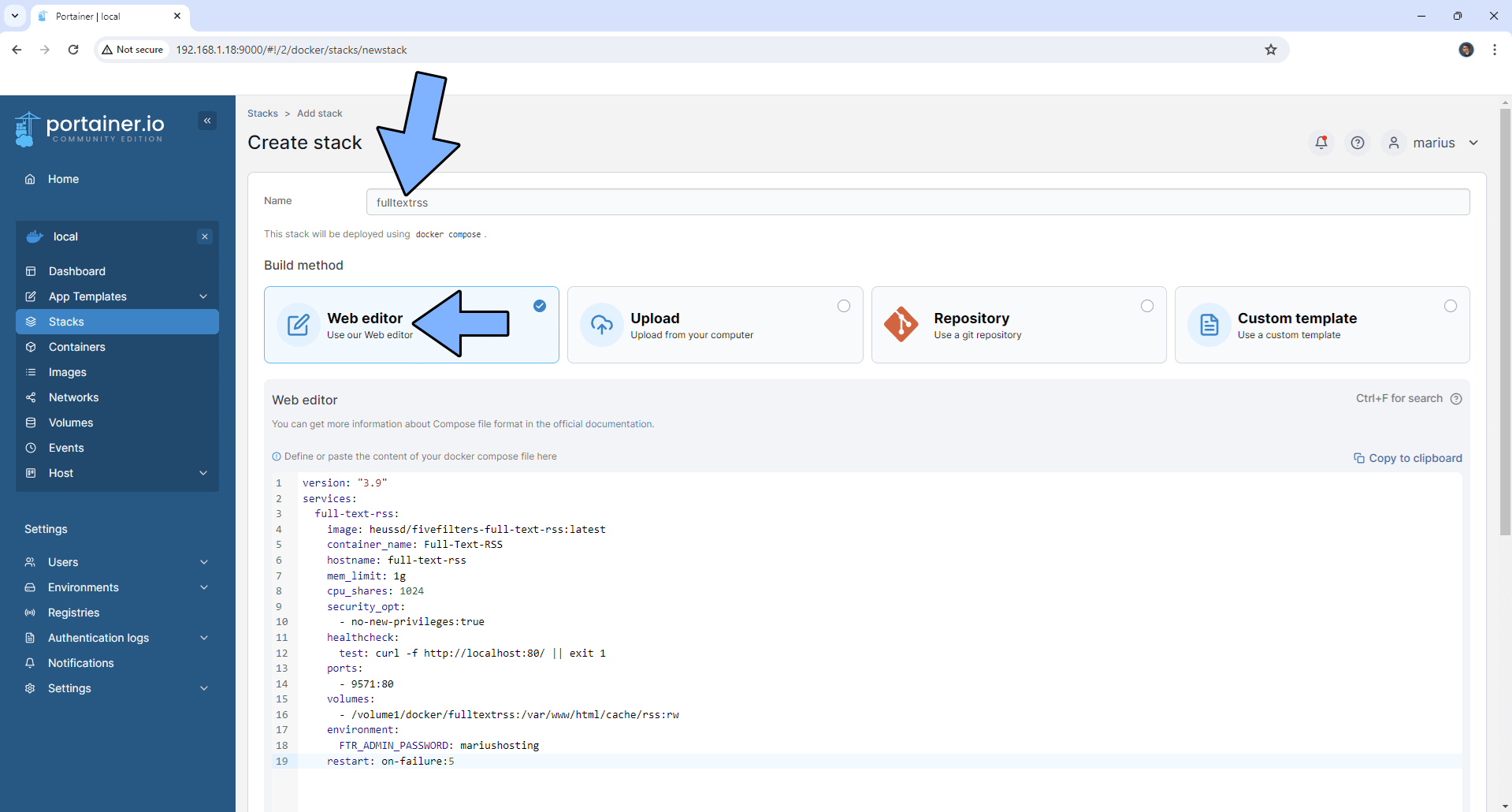
STEP 11
Scroll down on the page until you see a button named Deploy the stack. Click on it. Follow the instructions in the image below. The installation process can take up to a few minutes. It will depend on your Internet speed connection.
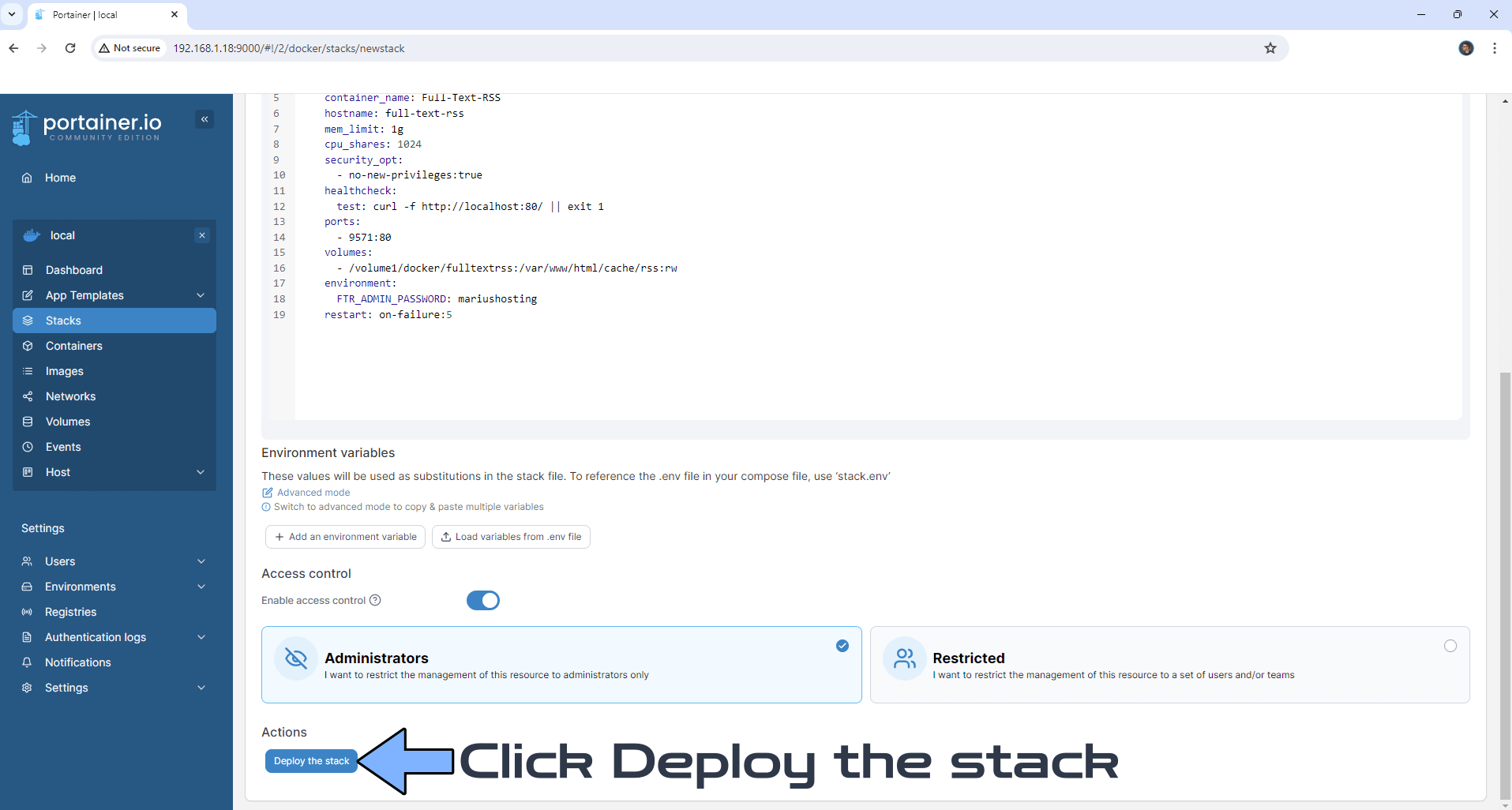
STEP 12
If everything goes right, you will see the following message at the top right of your screen: “Success Stack successfully deployed“.

STEP 13
🟢Please Support My work by Making a Donation. Almost 99,9% of the people that install something using my guides forget to support my work, or just ignore STEP 1. I’ve been very honest about this aspect of my work since the beginning: I don’t run any ADS, I don’t require subscriptions, paid or otherwise, I don’t collect IPs, emails, and I don’t have any referral links from Amazon or other merchants. I also don’t have any POP-UPs or COOKIES. I have repeatedly been told over the years how much I have contributed to the community. It’s something I love doing and have been honest about my passion since the beginning. But I also Need The Community to Support me Back to be able to continue doing this work.
STEP 14
The installation process can take up to a few seconds/minutes. It will depend on your Internet speed connection. Now open your browser and type in http://Synology-ip-address:9571 Type in your favorite URL, then click Create Feed. Follow the instructions in the image below.
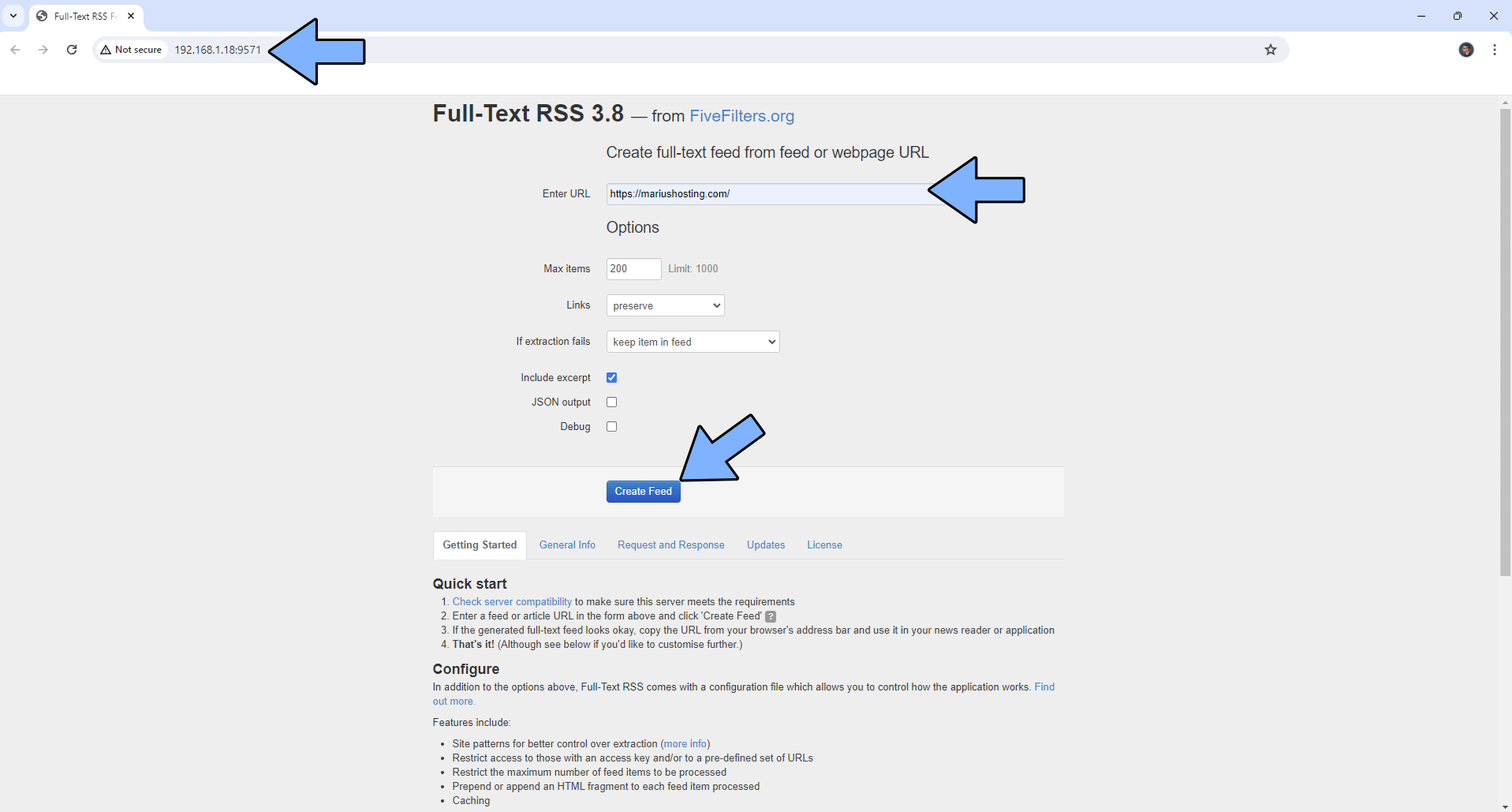
STEP 15
Your Full-Text-RSS at a glance!
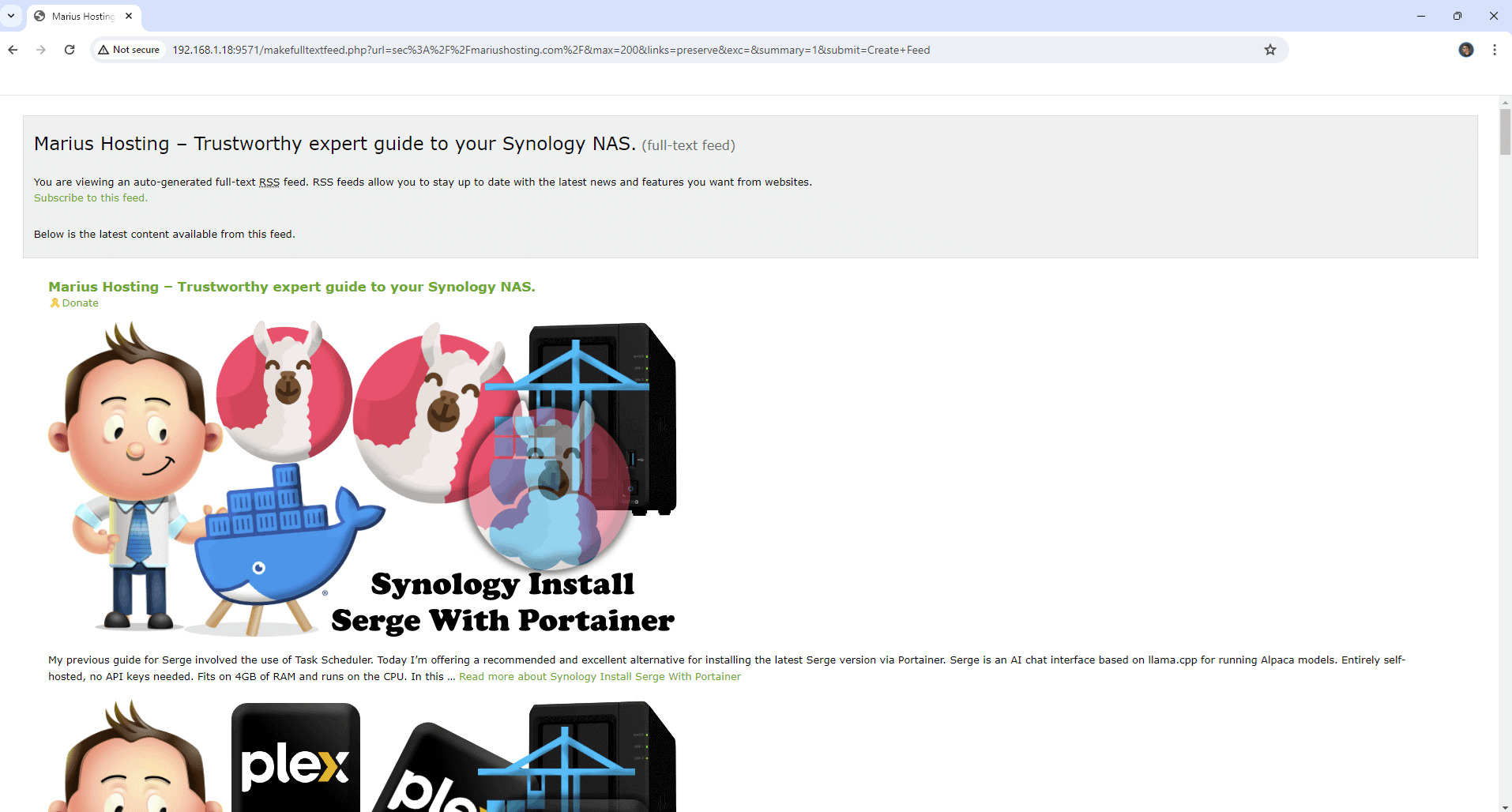
STEP 16
If you want, you can access the admin dashboard. Open your browser and type in http://Synology-ip-address:9571/admin/login.php Type in admin as Username and your own FTR_ADMIN_PASSWORD that you have previously added at STEP 10. Click Log In. Follow the instructions in the image below.
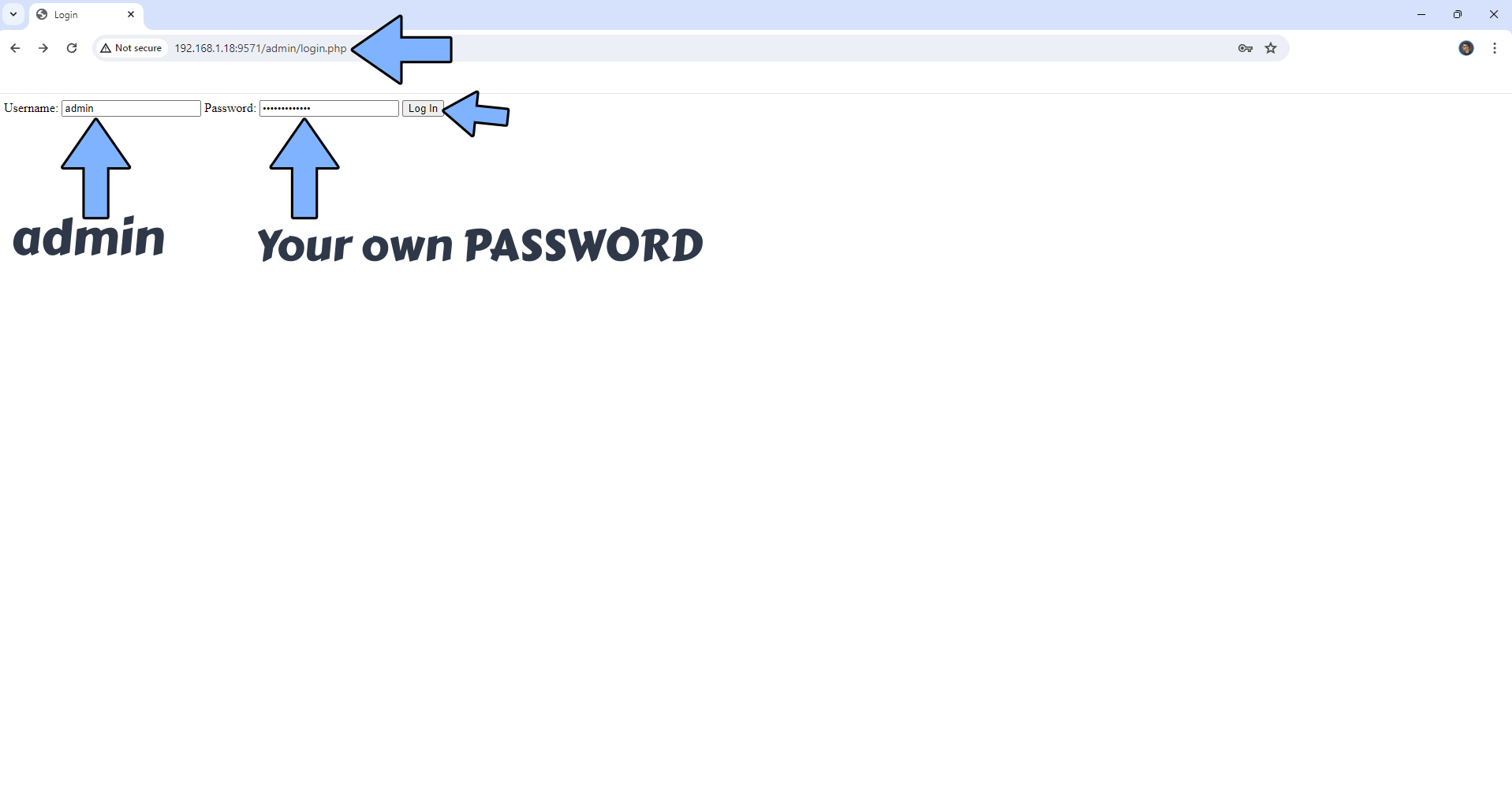
STEP 17
Your admin dashboard at a glance!
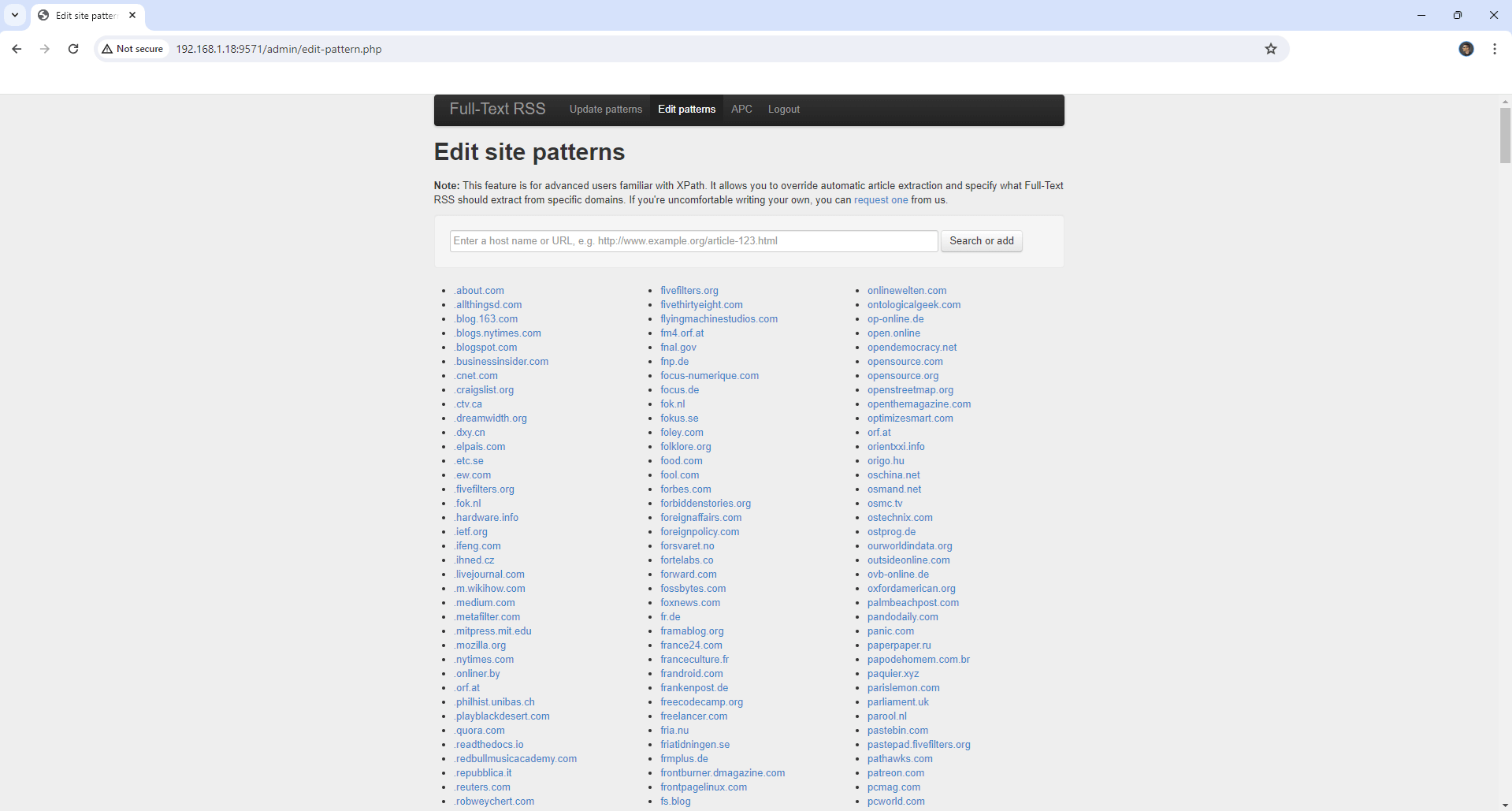
Enjoy Full-Text-RSS!
If you encounter issues by using this container, make sure to check out the Common Docker issues article.
Note: If you want to run the Full-Text-RSS container over HTTPS, check How to Run Docker Containers Over HTTPS. In order to make Full-Text-RSS work via HTTPS, it’s mandatory to activate WebSocket.
Note: Can I run Docker on my Synology NAS? See the supported models.
Note: How to Back Up Docker Containers on your Synology NAS.
Note: Find out how to update the Full-Text-RSS container with the latest image.
Note: How to Free Disk Space on Your NAS if You Run Docker.
Note: How to Schedule Start & Stop For Docker Containers.
Note: How to Activate Email Notifications.
Note: How to Add Access Control Profile on Your NAS.
Note: How to Change Docker Containers Restart Policy.
Note: How to Use Docker Containers With VPN.
Note: Convert Docker Run Into Docker Compose.
Note: How to Clean Docker.
Note: How to Clean Docker Automatically.
Note: Best Practices When Using Docker and DDNS.
Note: Some Docker Containers Need WebSocket.
Note: Find out the Best NAS Models For Docker.
Note: Activate Gmail SMTP For Docker Containers.
This post was updated on Thursday / August 28th, 2025 at 4:28 PM
